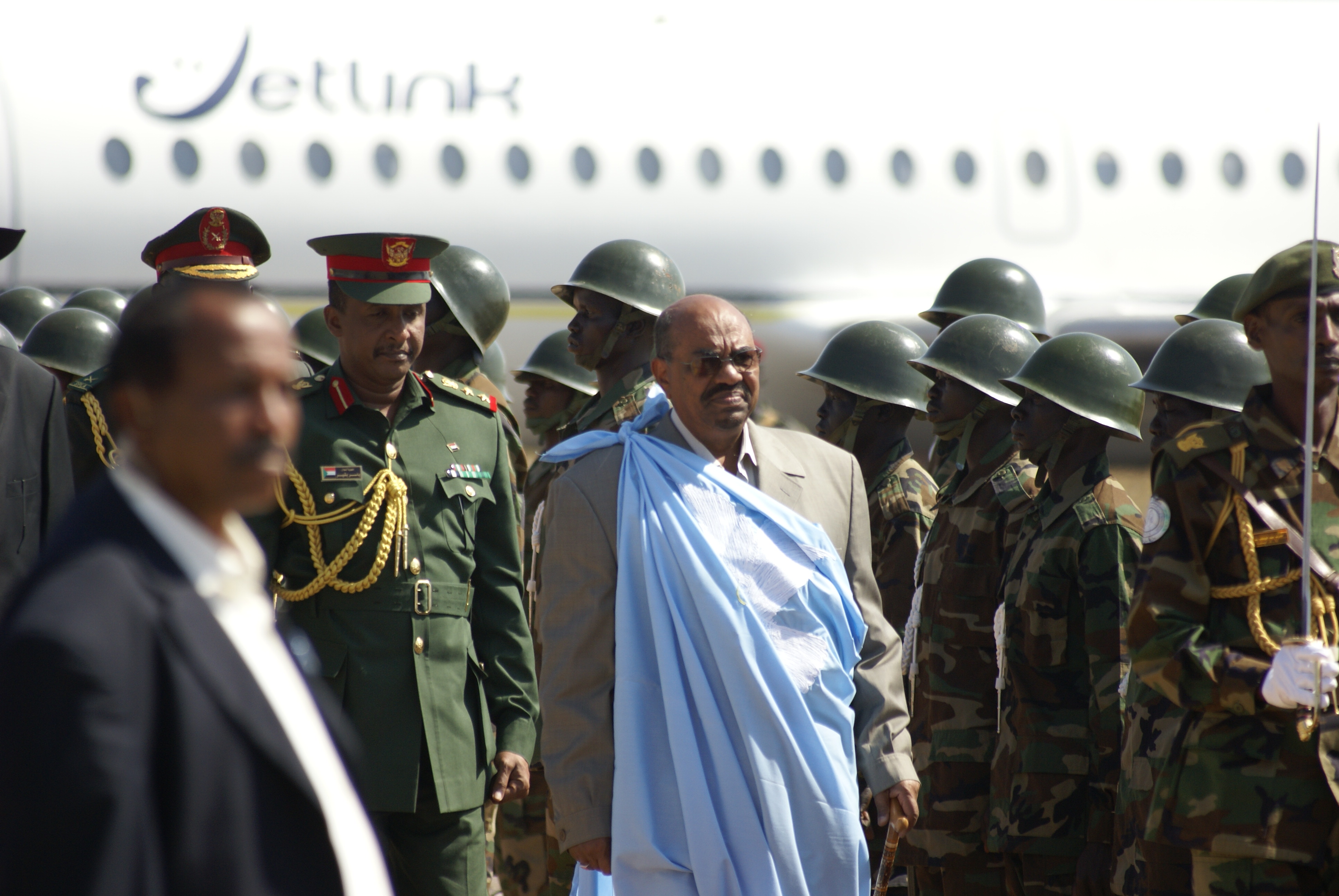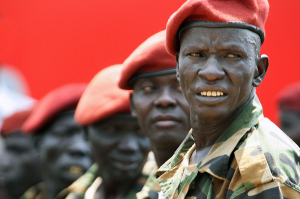By Stephen Jones
7 May 2019
Part 1, with Analysis as of 13 April 2019

Following months of protests demanding the resignation of long-time Sudanese dictator Omar al-Bashir, he was removed from power by a military coup on Thursday, 11 April 2019. The coup, led by former allies of the President, is far from a complete regime change and Sudan is by no means on a certain and steady road to democratic governance. Complicated further by territorial disputes with Egypt, an unstable peace agreement with South Sudan which may yet collapse into fresh civil war, and the legacy of ethnic cleansing and genocide in Darfur, the country has a difficult course to chart if the democratic vision of tens of thousands of protestors is to be realised. Amidst the ever-changing aftermath of the coup, this article will attempt the fool’s errand of predicting how the situation may develop in the medium- to long-term with regards to Sudan’s main players: former-President al-Bashir, the coup leaders, and the civilian protestors.
Who Mourns For al-Bashir?
So far, it seems, no-one. al-Bashir’s closest allies took part in the coup against him, led by the multi-tasking Defence Minister and Vice-President Ibn Auf, previously al-Bashir’s presumed successor. Even the Rapid Support Forces (RSF), the paramilitary force formerly loyal to the President has issued statements apologising for its role in the regime and pledging itself to “the protection of the Sudanese people”. As it is highly unlikely that any military or paramilitary faction will begin a civil war to return al-Bashir to power, his time as President is without a doubt over.
If no-one will champion al-Bashir against the coup, what lies in store for the former dictator? Indicted for war crimes and crimes against humanity by the International Criminal Court (ICC) since 2009 for the ethnic cleansing and genocide that he oversaw in the western region of Darfur during 2003 and 2004, many civil rights activists around the world had hoped he would be extradited to face justice in the Netherlands. However, the coup leaders have made it clear that they do not wish to extradite him. This is likely because the coup leaders themselves are implicated in the same crimes through their roles in senior military leadership at the time, such as Ibn Auf’s position as head of Military Intelligence during the oppressive campaign. To set a precedent of holding those responsible to account would leave the coup leaders vulnerable to prosecution themselves. This reluctance to see justice administered through internationally recognised institutions and processes does not paint an encouraging picture for those hoping to see Sudan transition to a law and norm-abiding democratic nation.
Instead, al-Bashir faces two possible futures. For the same reasons as above, it is likely Sudan’s new leaders will refuse to prosecute him domestically, and instead exile him to a regional ally or neighbour such as Saudi Arabia or Egypt. It is a realistic possibility that al-Bashir struck a deal with military leaders, not calling on his paramilitary supporters to resist the coup in return for avoiding prosecution and retaining a comfortable life in exile. This would again avoid setting a precedent of accountability for the crimes against humanity committed fifteen years ago. Alternatively, it is also likely that coup leaders will use al-Bashir as a scapegoat, prosecuting him in an unfair trial with a forgone conclusion, likely ending with his execution in an attempt to gain favour with the anti-Bashir protestors. Either way, it is highly unlikely that the former President will receive a free and fair trial; not a good start for those hoping that strong, independent judicial institutions would flourish to form the backbone of a new democracy.
You Say You Want A Revolution? Keep Waiting, says the Army.
Ever since soldiers stepped in to protect protestors from Government-aligned militias on 8 April, a military coup seemed inevitable. Announcing the coup on state TV on 11 April, Defence Minister and putsch leader Ibn Auf declared a three-month state of emergency and a two-year transitional period before any democratic formation of civilian government could be held. A concern for many Sudanese protestors, who continue to sit-in at army headquarters, is that the coup will end up as a mere rebranding rather than a revolution, with one dictator simply replaced by another.
The initial indications, however, are reasonably promising for the protestors demanding democratic, civilian government. Ibn Auf, the coup leader and former close ally of al-Bashir, stepped down on Friday, 12 April after less than twenty-four hours in charge of the country, declaring veteran soldier General Abdel Fattah al-Burhan his successor. Similarly, another close ally of al-Bashir and leader of the coup, head of Sudan’s intelligence service the National Intelligence and Security Service (NISS), Salih Ghosh resigned on Saturday, 13 April. Having orchestrated violent crackdowns on protestors since December, Ghosh was deeply unpopular with protestors despite his recent role in removing al-Bashir. In most military coups, the coup leaders declare themselves the new heads of government, usually after a brief power struggle between themselves. However, in Sudan we have seen former allies of the President first oust him, then — apparently voluntarily, although under large pressure from protestors — step down. It is unclear whether the resignations were driven by personal values, internal power politics, or fear of what angry protestors would do were they not placated. So far, no actor appears desperate to cling to power. While this is encouraging, protest movements should not drop their vigilance until their demands for democracy are enshrined in stable state institutions.
With a smaller public profile, little involvement in the Darfur genocide, and few direct links with al-Bashir, Sudan’s subsequently appointed leader al-Burhan was a less controversial figure than Ibn Auf; the military likely hoped his appointment would calm protestors’ demands for civilian governance, but the gambit did not worked and the sit-ins continued. A relatively unknown character, he had the support of the paramilitary RSF after fighting alongside them in Yemen against Houthi rebels, and it is likely that this support was a primary reason for his appointment over other candidates. Should the RSF yield significant influence over al-Burhan, many in Darfur will rightly become nervous, as the RSF is a direct descendant of the Janjaweed militias that committed the bulk of atrocities in 2003 and 2004.
Overall, following the coup, Sudan’s new leaders have attempted to placate protestors with resignations and promises of democracy after a two-year transition, rather than resorting to oppressive measures. While encouraging, there is a realistic possibility that military leaders are simply playing for time, waiting for international interest and attention to fade before reneging on promises of democracy and returning to violent oppression of protestors. The international community, particularly democratic nations and liberal bodies such as the United Nations (UN), must continue advocating for democratic reform. Coup leaders must be prevented from using this two-year transitional period as a chance to consolidate their personal power.
At Present, The Revolution Must Remain Televised
Protestors continue to sit-in at army headquarters in Khartoum demanding democratic civilian government. To get even this far since December, ordinary civilians, mobilised and organised by the Sudanese Professionals Association (SPA), have endured brutal oppressive measures from NISS forces and government-aligned militia groups. As discussed above, that oppression has largely been put on hold for now, although isolated incidents of protestors killed by stray bullets or attacked by NISS forces continue to be reported. It is highly unlikely that the protestors will end their calls for democracy until a civilian government has been formed; therefore, if Sudan’s new leader al-Burhan decides to hold onto power, he will need another way of dispersing these protestors. al-Burhan reportedly already enjoys the support of the RSF, Sudan’s largest paramilitary group, and he will likely have the loyalty of the military due to his rank of Lieutenant General and his reputation as a professional soldier. With the resignation of NISS head Ghosh, al-Burhan is now likely able to appoint a loyalist to lead the intelligence service. With all branches of Sudan’s security apparatus loyal to him, al-Burhan will easily be able to oppress and disperse the unarmed protestors should he so wish.
The most effective protection the protestors currently have from such oppression is the eyes of the world. With global media fixated on the developing situation, international bodies racing to help support a transition to democracy, and writers tripping over their editors to publish op-eds on each new event, the SPA-led protests have a rapt global audience. With the world watching, it is unlikely that al-Burhan will resort to oppressive measures for fear of international isolation, and even UN intervention as in Darfur. However, should news cycles move on, and international advocates for democracy be placated by vague promises of a transitional period, the protestors will lose their watchful shield. International actors must therefore not turn away from Sudan until a peaceful transition to democratic governance has been realised.
Protestors One, Dictators Nil; But It Is Only Half-Time
Overall, al-Bashir is gone for good, although he is unlikely to face justice for his oppressive policies in government and crimes against humanity in Darfur. The generals who replaced him have, so far, appeared to resist the temptations of seizing personal power and continuing al-Bashir’s brutal measures. The restraint, however, is likely due more to the intense pressure generated by the SPA-led protest movements that tirelessly continue to demand civilian governance. Should international attention waver or the protests falter, there is a realistic possibility this revolution will stumble in the second-half of this dramatic Sudanese tale, succumbing to yet another medalled dictator in uniform.
Stephen Jones is a Master’s student at Kings’ War Studies Department, following an MA in Psychology from the University of Edinburgh. His main research interests involve the psychological causes of inter-group conflict and violence, as well as the cognitive processes that allow disinformation campaigns and terror recruitment strategies to succeed. Before joining King’s, he worked for the UN in New York, observing the positive effects of diplomacy and international collaboration in conflicts large and small around the world.



